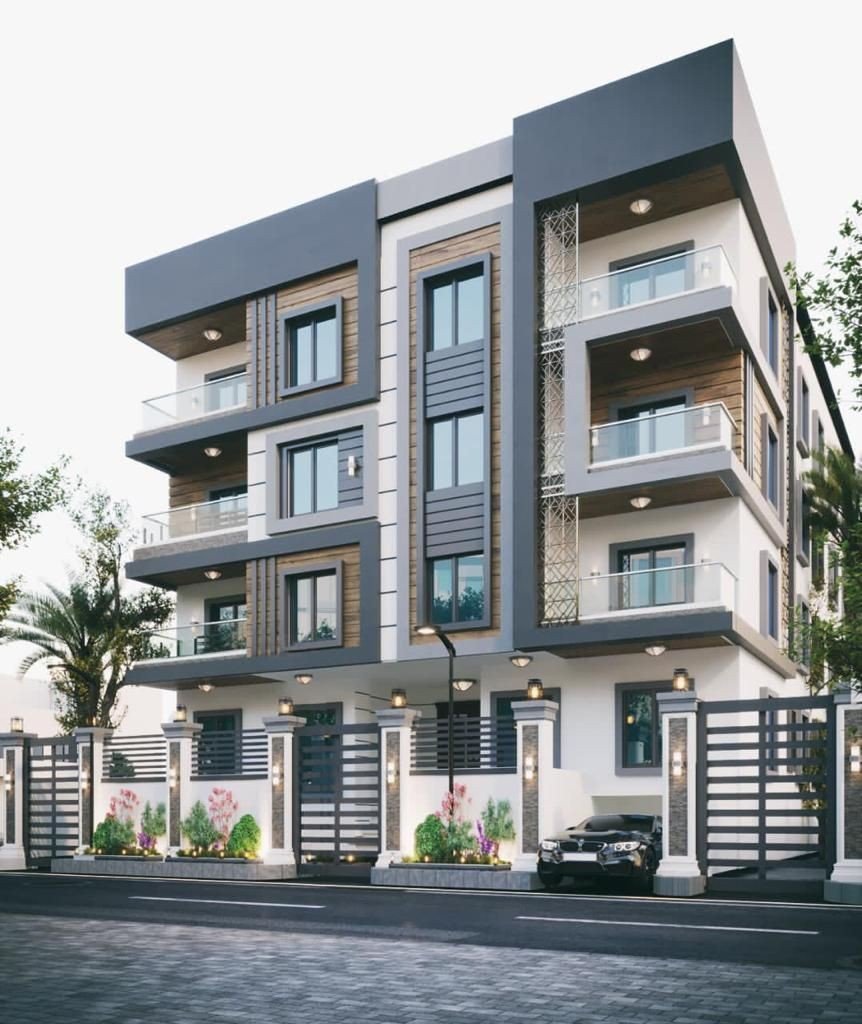7 Key Factors Differentiating Residential vs Commercial Real Estate Investment
Real estate investment in Egypt is one of the most stable and attractive sectors for both local and Arab investors, thanks to the growing demand for housing and commercial projects across the country’s new cities. However, many investors often ask: Which is better — residential or commercial investment?
To answer this question, it’s essential to first understand the nature of each type and the factors that distinguish one from the other. In this article, we explore seven key factors that clarify the differences between residential and commercial real estate investments in the Egyptian market, along with an in-depth analysis of the main advantages and challenges of each.
What Are Residential Properties?
Residential properties include all units intended for living, such as apartments, villas, duplexes, and studios. These properties are spread across new cities like New Cairo, the New Administrative Capital, Sheikh Zayed, and 6th of October.
Investors in this category aim to generate a steady income from rentals or profit from resale over time. This type of investment is the most common among individuals due to its stability and lower risk compared to commercial properties.
What Are Commercial Properties?
Commercial properties, on the other hand, are units used for business activities such as offices, retail stores, clinics, and malls.
Investors in this type of real estate aim to achieve higher rental yields, particularly in prime areas like Fifth Settlement, Nasr City, and Downtown Cairo, where demand from businesses and retailers is strong.
However, this type of investment requires larger capital and the ability to withstand longer vacancy periods before finding a suitable tenant.
The Difference Between Residential and Commercial Real Estate Investment
The distinction between residential and commercial properties lies in several key factors that influence returns, risk, and management. Below are seven main factors that clearly illustrate these differences.
1. Return on Investment (ROI)
Commercial properties generally offer higher returns, ranging between 10% to 15% annually, while residential properties yield around 5% to 8%.
Despite the higher commercial ROI, residential investment remains more stable due to consistent housing demand in Egypt.
2. Level of Risk
Commercial real estate is highly affected by economic fluctuations — during recessions, companies often reduce or halt leasing new spaces.
In contrast, the demand for housing remains steady regardless of market conditions, making residential real estate less risky in the long term.
3. Lease Terms and Contracts
Commercial leases are typically long-term, lasting between 3 to 5 years, providing investors with stable income.
Residential leases are usually annual or semi-annual, offering more flexibility in adjusting rent prices but requiring more frequent management.
4. Market Demand
Demand for residential properties in Egypt is significantly higher, especially with the growing population and expansion of new urban areas.
Commercial properties, however, depend on business activity and project location — demand is concentrated mainly in active commercial districts.
5. Maintenance and Management
Residential properties require simpler management and limited routine maintenance.
Commercial properties, on the other hand, demand continuous supervision and higher maintenance costs to preserve facilities and designs suitable for business activities.
6. Ease of Sale and Resale
Residential properties are easier to sell due to their appeal to various buyer segments (individuals, families, small investors).
Commercial properties target a narrower audience — mainly investors and companies — making sales and resale processes longer and more specialized.
7. Laws and Regulations
Commercial properties are subject to more complex systems regarding permits and taxes, while residential properties involve simpler legal procedures.
Therefore, beginner investors are generally advised to start with residential properties before moving into the commercial sector.
Which Is Better for a New Investor in Egypt?
For new investors, residential real estate is the safer and more manageable option.
However, those with larger capital and market experience may find commercial investment more profitable in the long run — particularly in major business areas like Fifth Settlement and Nasr City.

How to Choose Between Residential and Commercial Real Estate
Choosing between residential and commercial properties is one of the most important decisions any investor faces when entering Egypt’s real estate market. The right choice depends not only on the expected return but also on a combination of factors that determine the success of the investment in both the short and long term.
The decision is mainly based on three key factors:
1. Available Capital
Commercial properties typically require a larger budget due to higher construction or purchase costs. In contrast, residential properties offer investment opportunities across various budgets — from small apartments to luxury villas.
2. Risk Tolerance
Commercial real estate investment involves higher risk because it is affected by economic conditions and market demand for business activities.
Residential real estate, on the other hand, is less volatile, as housing demand remains constant regardless of market fluctuations.
3. Long-Term Investment Goals
If your goal is to generate stable and consistent income with minimal fluctuations, residential properties are the ideal choice.
However, if you aim for higher returns and faster capital growth, and can handle possible market slowdowns, commercial properties offer promising opportunities — especially in thriving areas like Fifth Settlement and the New Administrative Capital.
It is also crucial to study the property’s location and its suitability for the intended investment.
Areas near universities and densely populated neighborhoods are ideal for rental housing, while locations near main roads and business hubs are better suited for offices and retail spaces.
New investors are advised to start with residential investments to gain experience in property management and understand market trends, then gradually expand into commercial investments after learning the dynamics of demand and leasing in that sector.
Finally, it’s essential to consult a trusted real estate expert or broker to evaluate economic feasibility and projected ROI for each property type before making a final decision — as a smart choice between the two can shape your investment success for years to come.
The Future of Residential and Commercial Investment in Egypt 2025
Economic indicators suggest that Egypt’s real estate market will continue its strong growth throughout 2025 and beyond, supported by the government’s urban expansion plans and large-scale infrastructure development.
National projects such as the New Administrative Capital, New Alamein, and New Mansoura have become major drivers attracting both local and Arab investors, offering diverse opportunities across residential and commercial sectors.
Demand for residential properties is expected to rise due to continuous population growth and the increasing trend of Egyptians relocating to new cities in search of better living standards and modern services.
Forecasts indicate that residential property prices may increase by 10% to 15% annually in key areas such as New Cairo, Sheikh Zayed, and the New Administrative Capital.
The commercial sector, meanwhile, is set to expand significantly alongside the development of new business districts — particularly in the Administrative Capital and Fifth Settlement — as local and international companies establish modern headquarters aligned with digital transformation needs.
With the ongoing growth of the service and tech sectors, demand for modern office spaces and commercial units equipped with the latest technologies is expected to increase.
Overall, the future of real estate investment in Egypt — both residential and commercial — looks highly promising amid economic stability and growing investor confidence in real estate as one of the safest and most profitable sectors.
The market is also expected to diversify further, offering a wide range of real estate products to meet different investor needs — from compact apartments to premium office spaces — making property investment a strategic long-term choice for anyone seeking stable returns and financial security.
Expert Tips Before Making an Investment Decision
- Define your financial goals clearly before buying.
- Compare the expected return with market risks.
- Consult a trusted real estate broker to explore available options.
- Avoid rushing to sell — real estate is inherently a long-term investment.
- Monitor market trends regularly to keep your investment decisions updated.
Frequently Asked Questions (FAQ) About Residential and Commercial Real Estate Investment
1. What is the main difference between residential and commercial properties?
Residential properties are meant for living, while commercial properties are used for business activities.
2. Which is more profitable?
Commercial properties generally yield higher returns, but residential properties offer greater stability.
3. What is the minimum investment for commercial real estate in Egypt?
It varies by location but usually starts from EGP 2 million for smaller units.
4. Can foreign investors buy commercial properties in Egypt?
Yes, under Egyptian laws that allow foreign ownership of specific properties under certain conditions.
5. What are the most attractive areas for residential investment right now?
The New Administrative Capital, New Cairo, and Sheikh Zayed.
6. Are residential rents more stable than commercial rents?
Yes, because housing demand is continuous and steady.
7. How can I decide between residential and commercial property?
Define your investment goals and assess the expected return and risks before deciding.
8. What are the main risks in commercial real estate investment?
Market stagnation, delayed rental payments, and high maintenance costs.
9. Is residential real estate suitable for long-term investment?
Absolutely — it’s one of the safest asset types in the Egyptian market.
10. What is the average annual return on residential real estate?
Between 5% and 8% in most new cities.

11. Do taxes differ between residential and commercial properties?
Yes, commercial properties are subject to stricter regulations and higher taxes than residential ones.
12. How important is location in determining investment success?
Location is the most crucial factor — commercial properties require more strategic and high-traffic locations compared to residential ones.
13. What type of property is best in the New Administrative Capital?
Small residential units and medium-sized office spaces are currently the most in demand.
14. Can both types be included in one investment portfolio?
Yes, combining residential and commercial properties helps diversify risks and balance returns.
15. What is the ideal time frame to achieve profit from real estate investment?
On average, 3 to 5 years are needed to realize a noticeable return.
16. What is the best way to finance the purchase of an investment property?
Through mortgage financing from banks or direct installment plans offered by developers.
17. Does inflation affect real estate returns?
Yes, but it’s usually offset by rising rental income and property values over time.
18. Is residential real estate investment suitable for young investors?
Yes, it requires lower capital, and one can start with a small apartment.
19. What are the most common mistakes among new investors?
Buying without conducting market research or overestimating quick profits.
20. How can I stay updated on Egypt’s real estate market trends?
By following monthly developer reports, real estate news websites, and official price indexes.
In conclusion, residential and commercial real estate investments complement each other within the Egyptian market, with each offering unique advantages.
The optimal choice depends on the investor’s goals, available capital, and risk tolerance.
With Egypt’s ongoing urban expansion, the real estate sector in all its forms remains one of the safest and most profitable long-term investment opportunities.


